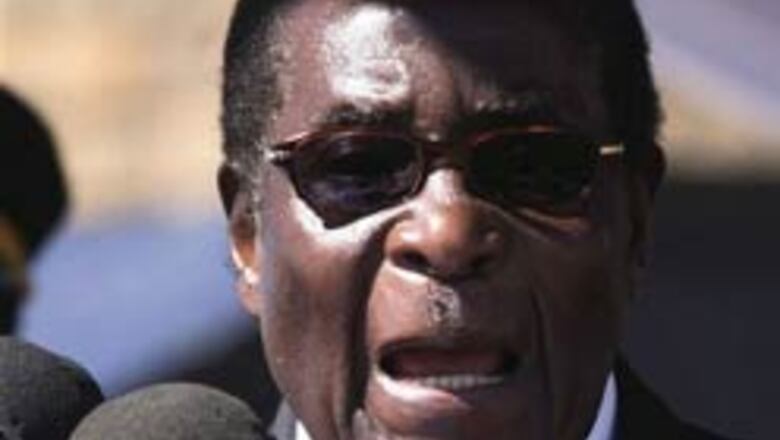
views
Harare, Zimbabwe: Three months after the voting and violence began, embattled President Robert Mugabe and his opposition rival agreed to hold talks about sharing power to bring an end to Zimbabwe's deadly political crisis.
But Zimbabweans worn down by the daily grind of finding food in a country with the world's worst inflation had little energy to celebrate Monday. Instead, they lined up outside banks for Zimbabwe's new $100 billion note, enough to buy two loaves of bread.
Monday's handshake to discuss forging an ''inclusive'' government was a victory for opposition leader Morgan Tsvangirai, who beamed as he signed the deal nearly three months after winning the first round of the presidential vote.
For him, the agreement contains a key opposition demand: an end to the political violence that has killed dozens, injured thousands and send tens of thousands fleeing from their homes.
Talks will begin Thursday in Pretoria, the South African capital, but will not include either leader, an official from Tsvangirai's party said on condition of anonymity because he is not authorized to speak to the media.
Mugabe, who has ruled Zimbabwe for all 28 years since independence and just last month declared election victory, appeared nervous at the ceremony. Head bent and looking beaten as he stood between two jubilant opposition leaders, Mugabe never once looked at Tsvangirai during the hourlong ceremony. Afterward, he shook hands with everyone except his rival.
Asked about it at a news conference later, he posed for journalists, giving Tsvangirai a limp handshake.
Also present was South Africa's President Thabo Mbeki, the mediator. Shrugging off criticism about his approach on Mugabe, Mbeki has long argued that dialogue and not punitive sanctions is the only way to deal with the longtime African leader.
Mugabe, 84, has been in power since 1980 and for years was revered for leading the seven-year bush war to oust the white-minority government that ruled the former British colony.
He was praised for promoting reconciliation with whites, promising white commercial farmers who were the backbone of the economy and owned two-thirds of the country's best farmland that they, too, had ''a place in the sun.''
But in 2000, Mugabe lost a referendum that sought to allow the government to appropriate white-owned farmland without compensation and to resettle black peasant farmers on the properties.
Mugabe accused white farmers of backing Tsvangirai, who had become leader of the opposition Movement for Democratic Change in 1999, and set loose so-called ''war veterans'' from his ruling ZANU-PF party to violently invade the farms.
Despite Mugabe's claim of seizing the farms for Zimbabwe's blacks, most of the land went to Mugabe's ministers and generals and was left to lie fallow.
Today, Zimbabwe, once a supplier of food to the region is an economic disaster zone with an official inflation rate of 2.2 million percent and 80 percent unemployment. A third of the population has fled to neighboring countries and abroad, while another third depends on international food aid.
Mugabe has faced allegations of holding rigged and fraudulent elections in his bid to hold onto power.
In March, Zimbabweans tired of scrounging for basics elected the most opposition members to parliament ever. In the presidential election, Tsvangirai garnered the most votes but not enough to win outright.
Tsvangirai, 56, pulled out of the June runoff against Mugabe, citing escalating state-sponsored violence against his supporters. Mugabe declared victory, though the one-man runoff election was widely considered a sham.
On Monday, the two leaders agreed on the need to work together ''in an inclusive government'', the closest language to a power-sharing accord.
The deal commits them to creating a ''genuine, viable, permanent and sustainable solution'' quickly, within two weeks.
Tsvangirai called the deal ''the first tentative step toward searching for a solution.''
Mugabe said they must ''chart a new way'' but act without influence from Europe or the United States. That was a dig at Tsvangirai, whom he has branded a Western puppet in the past.
The objectives and priorities laid out in the outline include restoring economic stability, Western sanctions targeting Mugabe and about 130 of his cronies, and land reform.
For Mugabe and Tsvangirai, it was their first meeting in a decade. They had crossed paths ''for the first and last time'' at a 1998 Workers' Day rally when Tsvangirai was secretary-general of Zimbabwe's trade union federation, said George Sibotshiwe, a spokesman for Tsvangirai's party.
Many observers and analysts say a coalition, perhaps with Mugabe as president and Tsvangirai as prime minister or vice president is the only way to lead the nation forward.
The Bush administration, which had pushed for UN sanctions, said Monday it supports any negotiations that lead to results reflecting the people's will, State Department spokesman Gonzalo Gallegos said in Washington.
Meanwhile, Zimbabweans lined up for hours to get their daily cash withdrawal allowance of 100 billion dollars.
The new note immediately went up for sale at eBay. The seller put a reserve of US$79.94 on the new note, which in Zimbabwe is worth US$5 at the official rate and just $1 on the more reliable black market.




















Comments
0 comment